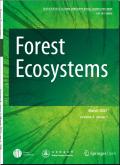Meta-analysis of 21st century studies shows that deforestation induces profound changes in soil characteristics, particularly soil organic carbon accumulation
IF 4.4
1区 农林科学
Q1 FORESTRY
引用次数: 0
Abstract
Deforestation is one of the most serious environmental problems facing humankind. It continues to escalate rapidly across many regions of the world, thereby deteriorating the forest soil quality. This has prompted a large number of field-based studies aimed at understanding the impacts of deforestation on soil properties. However, the lack of comprehensive meta-analyses that utilized these studies has limited our deeper understanding of how different soil properties, including the soil organic carbon (SOC) pool, respond to deforestation. To address this critical knowledge gap, we conducted a meta-analysis of 144 studies to explore the impacts of deforestation on soil chemical, physical, and biological properties, with special emphasis on the long-term changes in SOC, such as concentrations, stocks, and sequestration. The results revealed that deforestation significantly decreased soil organic matter, electrical conductivity, and base saturation by 52%, 50%, and 98%, respectively. While deforestation increased soil total nitrogen content and decreased available phosphorus content by 51% and 99%, respectively, it resulted in slight decreases in some chemical properties, including soil pH (1%) and base cations (1%–13%). Deforestation significantly increased bulk density by 27% and soil erosion by 47%, but significantly decreased soil aggregate stability by 39% and saturated hydraulic conductivity by 63%. Soil microbial biomass C and N concentrations and enzyme activities were significantly decreased as a consequence of deforestation. Soil biological properties were much more affected by deforestation than soil physical and chemical properties. Regarding the SOC, the land use conversion from forest to pasture significantly increased SOC concentrations, stocks, and sequestration rates (11%–13%), whereas the land use conversions from forest to both plantation and cropland significantly decreased SOC concentrations, stocks, and sequestration rates (10%–43%). This observed decline in SOC accumulations decreased with increasing years after deforestation. The SOC dynamics following deforestation were predominantly regulated by microbial biomass concentrations, dehydrogenase activity, soil erosion, saturated hydraulic conductivity, aggregate stability, as well as concentrations of total organic carbon, total nitrogen, total phosphorus and organic matter. The present meta-analytical study provides compelling evidence that deforestation can induce profound changes in soil characteristics, including soil C contents, and has significant implications for soil health sustainability and climate change mitigation.
对 21 世纪研究的元分析表明,砍伐森林会导致土壤特性,特别是土壤有机碳积累发生深刻变化
毁林是人类面临的最严重的环境问题之一。在世界许多地区,毁林现象仍在迅速加剧,从而导致森林土壤质量恶化。这促使人们开展了大量实地研究,以了解森林砍伐对土壤特性的影响。然而,由于缺乏利用这些研究的综合荟萃分析,限制了我们对不同土壤特性(包括土壤有机碳库)如何应对森林砍伐的深入了解。为了填补这一重要的知识空白,我们对 144 项研究进行了荟萃分析,以探讨森林砍伐对土壤化学、物理和生物特性的影响,并特别关注 SOC 的长期变化,如浓度、储量和固碳。结果显示,森林砍伐使土壤有机质、电导率和碱饱和度大幅下降,降幅分别为 52%、50% 和 98%。虽然毁林增加了土壤全氮含量,降低了可用磷含量,降幅分别为 51% 和 99%,但毁林导致一些化学特性略有下降,包括土壤 pH 值(1%)和碱基阳离子(1%-13%)。毁林使容重明显增加了 27%,土壤侵蚀增加了 47%,但使土壤团聚稳定性明显降低了 39%,饱和导水率降低了 63%。森林砍伐导致土壤微生物生物量 C 和 N 浓度以及酶活性明显下降。与土壤理化性质相比,毁林对土壤生物性质的影响更大。在 SOC 方面,从森林到牧场的土地用途转换显著提高了 SOC 的浓度、储量和固存率(11%-13%),而从森林到种植园和耕地的土地用途转换则显著降低了 SOC 的浓度、储量和固存率(10%-43%)。观察到的 SOC 储量下降随着森林砍伐后年数的增加而减少。森林砍伐后的 SOC 动态主要受微生物生物量浓度、脱氢酶活性、土壤侵蚀、饱和水力传导性、聚合稳定性以及总有机碳、总氮、总磷和有机质浓度的调节。本元分析研究提供了令人信服的证据,证明砍伐森林会导致土壤特性(包括土壤碳含量)发生深刻变化,并对土壤健康的可持续性和减缓气候变化产生重大影响。
本文章由计算机程序翻译,如有差异,请以英文原文为准。
求助全文
约1分钟内获得全文
求助全文
来源期刊

Forest Ecosystems
Environmental Science-Nature and Landscape Conservation
CiteScore
7.10
自引率
4.90%
发文量
1115
审稿时长
22 days
期刊介绍:
Forest Ecosystems is an open access, peer-reviewed journal publishing scientific communications from any discipline that can provide interesting contributions about the structure and dynamics of "natural" and "domesticated" forest ecosystems, and their services to people. The journal welcomes innovative science as well as application oriented work that will enhance understanding of woody plant communities. Very specific studies are welcome if they are part of a thematic series that provides some holistic perspective that is of general interest.
 求助内容:
求助内容: 应助结果提醒方式:
应助结果提醒方式:


